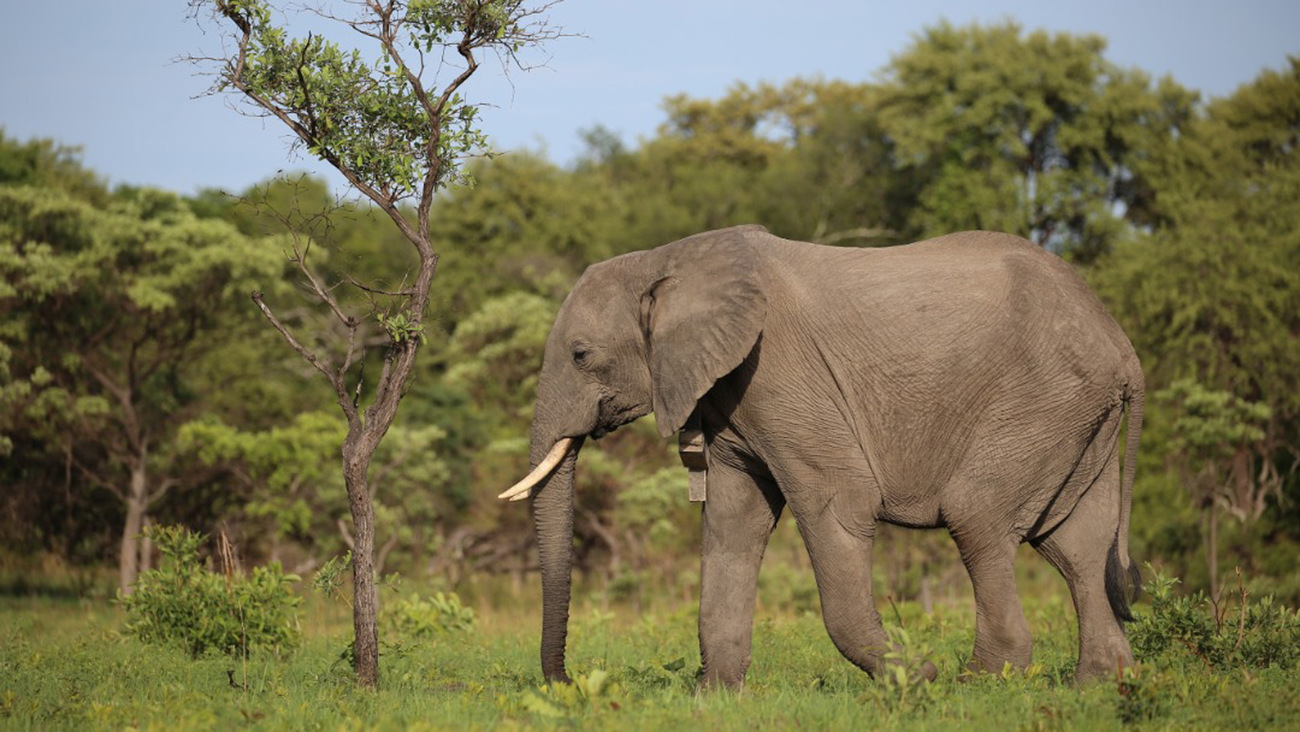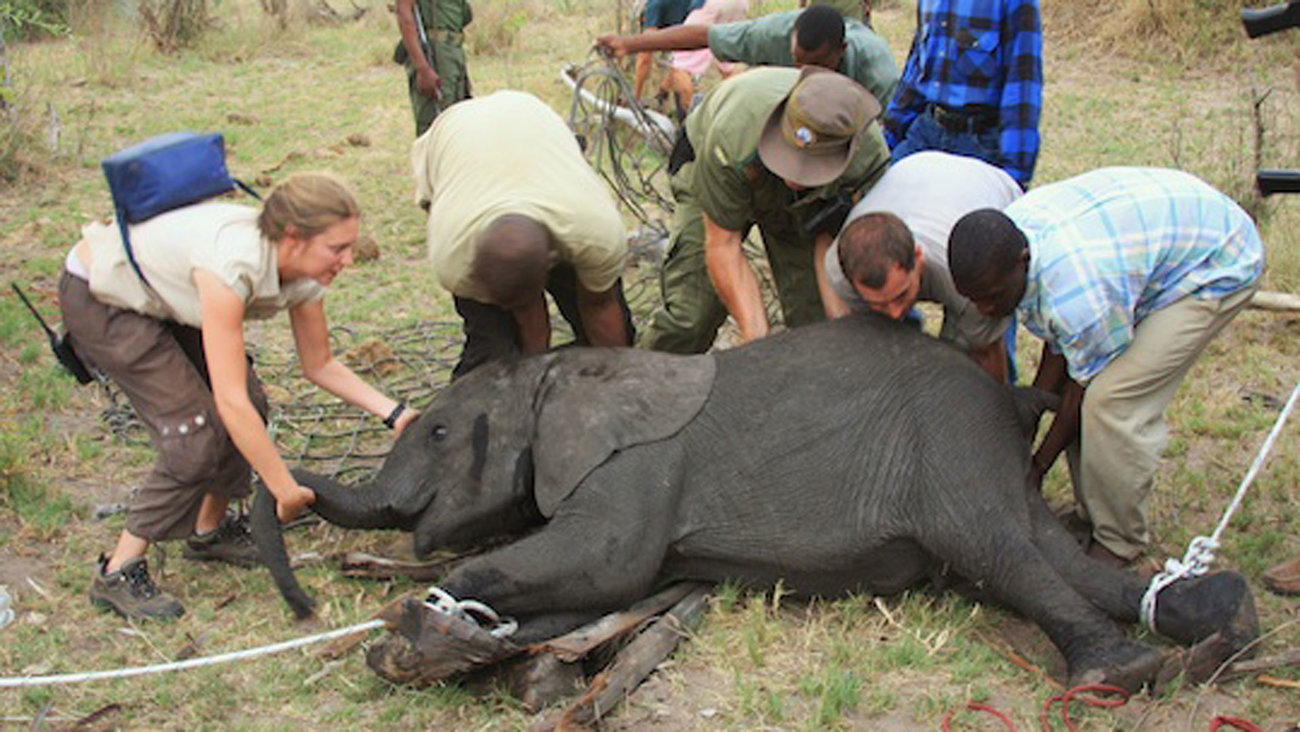Lusaka Elephant Nursery - Zambia
Orphaned elephants need a new herd and a new homeBatoka becomes the first elephant in Zambia to return to the wild
Batoka becomes the first elephant in Zambia to return to the wild

A very emaciated elephant calf was spotted alone on an island in Zambia’s Zambezi River, which is near Mosi-Oa-Tunya National Park (home to the incredible Victoria Falls). Micro-flight pilots from “Batoka Sky” had discovered the young calf and proceeded to alert teams from Zambia’s Department of National Parks and Wildlife and IFAW partner, Game Rangers International (GRI).
With tremendous support from the local community and Batoka Sky, the calf, who was estimate to be 1.5 years old, was darted by helicopter and captured by hand. Once captured safely, the team transferred the calf to the mainland by boat and brought him to an enclosure in the Park where he was stabilized. After a couple of days, the young orphan, named ‘Batoka,’ was strong enough to make the 8-hour drive north to the rescue facility in Kafue National Park (his rescue was prior to the Elephant Orphanage Project nursery facility in Lusaka).
Rachael Murton, Wildlife Rescue Director at GRI, recalls Batoka’s difficult transition upon arrival at the nursery. “Seeing Batoka meet the other elephants was heart-breaking as he didn’t take to the herd instantly. He had seemingly been alone for so long and was potentially suffering with post-traumatic stress, so would not interact willingly with the others, despite their gentle attempts. He even seemed too despondent to mud bathe and I remember him standing to the side as the others rolled in the mud and on top of one another. Poor Batoka stood alone looking dejected and would not get in the mud. So we used to help him mud bathe, slapping the mud on and rubbing him to stimulate some interest in this activity which is so fundamental to elephants.”
Integrating into the rescue herd
It took years for Batoka to develop deep, meaningful relationships with the other rescued elephant calves. Tafika, who is the closest bull to his age, became his playmate and the two were seen ‘tusking’, pushing and climbing on one another frequently over the years.
This type of play is normal and important as it develops muscles and survival skills they will require as independent wild bulls.
Another one of Batoka’s important and strongest bonds is with Chamilandu, who is his closest age-mate and long-term surrogate sibling. The two of them found confidence in each other’s company and left the facility overnight many times, roaming and exploring the wild.
When Chamilandu gave birth to her first calf (by a wild elephant father) in September 2019, she returned to the facility – the place she felt the safest.
Batoka returned alongside her, but remained outside the facility and roamed the area nearby.
Embarking on a journey back to the wild
In February 2020, Batoka left the Release Facility by himself and returned only for a few days in May before he departed again.
This is the breakthrough in Batoka's re-wilding. He has demonstrated that he possesses the confidence to defend himself against predators, forage adequately and socialise with wild elephants. The team was able to get drone footage of his immersion within wild elephant society – but the apex of his journey came when GRI CEO Sport Beattie saw Batoka amongst a super herd of 70 plus wild elephants on a lakeshore in Kafue National Park.
“Batoka completing his journey back to the wild affirms that we can successfully rescue, rehabilitate, and release orphaned elephant calves in Zambia. Orphaned calves experience a traumatic and disadvantaged start to their lives, but we are seeing evidence that our care, research and protocols can provide the confidence and tools needed for them to thrive in the wild,” said Katie Moore, Deputy Vice President for Animal Rescue at IFAW.
Batoka has spent the last 11 years learning life skills and adjusting to life with wild herds. We’re incredibly proud to see him take this big step and look forward to watching him live a long life in the wild, where he belongs.
Hope for Zongo and Mbila
Earlier in this year, two orphaned elephant calves were found near a community in Kafue National Park, teams from GRI were once again called to the rescue. The calves were safely caught and transported to the Elephant Orphanage Project (EOP) nursery in Lusaka for critical 24/7 care. Both have adjusted well to life at EOP where they joined four other orphaned calves currently in rehabilitation at the nursery. The new calves were named Shezongo (Zongo) and Mbila, and the goal for them is the same for Batoka – to be released back to the wild. For now, they continue to grow strong and confident, learning the foundational skills that they will need for their future life in Kafue.

Batoka's journey
Related content
Every problem has a solution, every solution needs support.
The problems we face are urgent, complicated and resistant to change. Real solutions demand creativity, hard work and involvement from people like you.